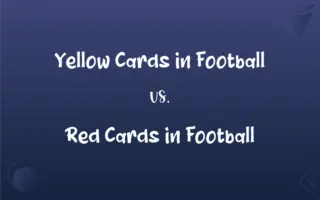DataReader vs. DataSet: What's the Difference?
Edited by Aimie Carlson || By Harlon Moss || Published on February 7, 2024
A DataReader is a forward-only stream for reading data from a database, while a DataSet is an in-memory representation of data that can hold multiple tables and support data manipulation.

Key Differences
DataReader is a connected, forward-only, read-only cursor in ADO.NET used to retrieve data from a database sequentially. It is efficient for quick read access to a large volume of data. DataSet, conversely, is a disconnected, in-memory cache of data retrieved from a data source. It can hold multiple DataTables and offers data manipulation capabilities, such as adding, updating, or deleting rows.
When using a DataReader, the connection to the database remains open until the reading operation is completed. It is fast and consumes less memory as it retrieves one row at a time. In contrast, a DataSet copies data from a data source into a disconnected in-memory representation, allowing the connection to be closed sooner. A DataSet is bulkier in terms of memory usage but provides greater flexibility in data manipulation.
DataReader is ideal for scenarios where the application requires a read-only, forward-only way to access data quickly and efficiently, like displaying data in a report. The DataSet is more suited for complex scenarios where data needs to be related, manipulated, or bound to user interface controls, as it can manage relationships between tables and enforce constraints.
With DataReader, the approach is more linear and straightforward, providing a fast and efficient method for reading database data, particularly useful in high-performance applications. DataSet offers a more versatile approach, as it allows navigation between different tables, searching, and updating the data, which is especially beneficial in applications where a comprehensive data manipulation framework is needed.
The DataReader is typically used in situations where the data is read-only and does not require any manipulation by the application. Meanwhile, the DataSet is often used in situations where the application needs to work with data in a more complex way, including support for XML data manipulations and data binding features.
ADVERTISEMENT
Comparison Chart
Connection Requirement
Requires open connection to data source
Disconnected from data source
Data Retrieval
Forward-only, read-only
Can hold multiple tables, supports manipulation
Memory Usage
Low, as it streams data
Higher, stores data in memory
Use Case
Quick data reading, no manipulation needed
Complex data operations and user interface binding
Flexibility and Functionality
Less flexible, linear data access
More flexible, allows data relation and updates
ADVERTISEMENT
DataReader and DataSet Definitions
DataReader
Provides fast, read-only access to data.
We used a DataReader for quick data retrieval in our application.
DataSet
Supports operations like searching and navigating between tables.
Using a DataSet made it easier to navigate through related tables.
DataReader
Used for sequential reading of database records.
The DataReader sequentially processed each row of the query result.
DataSet
Disconnected, can manipulate and update data.
The DataSet allowed us to update data before sending it back to the database.
DataReader
A forward-only stream to read data from a database.
The DataReader efficiently fetched records from the database.
DataSet
Can be used with or without a database.
We used a DataSet to manage application data independently from the database.
DataReader
Ideal for applications that need fast data display.
For our reporting tool, the DataReader was the perfect choice.
DataSet
An in-memory data cache that can hold multiple tables.
We stored the query results in a DataSet for further manipulation.
DataReader
A connected data retrieval mechanism in ADO.NET.
Our application's performance improved using a DataReader.
DataSet
Suitable for complex data scenarios in applications.
For our multi-table application, we used a DataSet to manage data relationships.
DataSet
Alternative spelling of data set
FAQs
When is a DataSet more appropriate?
In complex scenarios needing data manipulation and relationships.
Does DataReader allow data manipulation?
No, it’s read-only.
What is a DataSet?
An in-memory representation of data that can hold multiple tables.
Is DataReader connected or disconnected?
It's connected; requires an open data source connection.
What are the performance implications of using a DataReader?
It's faster and more efficient for large data sets.
Can DataReader navigate back and forth in data?
No, it’s forward-only.
Can DataReader update data in the database?
No, it’s used only for data retrieval.
When should I use a DataReader?
When you need fast, sequential, read-only access to data.
What is a DataReader?
A forward-only, read-only mechanism for reading data from a database.
Can DataSet handle multiple data tables?
Yes, it can manage multiple related data tables.
Does DataSet support XML?
Yes, it can work with XML data.
How does DataSet handle data relationships?
It can manage relationships and enforce constraints.
Can DataSet reflect changes back to the database?
Yes, with proper configuration and updates.
Can DataSet be used for data binding?
Yes, it's suitable for data binding in UI controls.
Is DataSet connected or disconnected?
It's disconnected; data can be manipulated without a live connection.
Can DataSet be used without a database?
Yes, it can function independently of a database.
How does DataReader affect application performance?
It enhances performance by minimizing memory usage.
Is DataReader good for limited memory environments?
Yes, due to its streaming nature and low memory usage.
About Author
Written by
Harlon MossHarlon is a seasoned quality moderator and accomplished content writer for Difference Wiki. An alumnus of the prestigious University of California, he earned his degree in Computer Science. Leveraging his academic background, Harlon brings a meticulous and informed perspective to his work, ensuring content accuracy and excellence.
Edited by
Aimie CarlsonAimie Carlson, holding a master's degree in English literature, is a fervent English language enthusiast. She lends her writing talents to Difference Wiki, a prominent website that specializes in comparisons, offering readers insightful analyses that both captivate and inform.































































